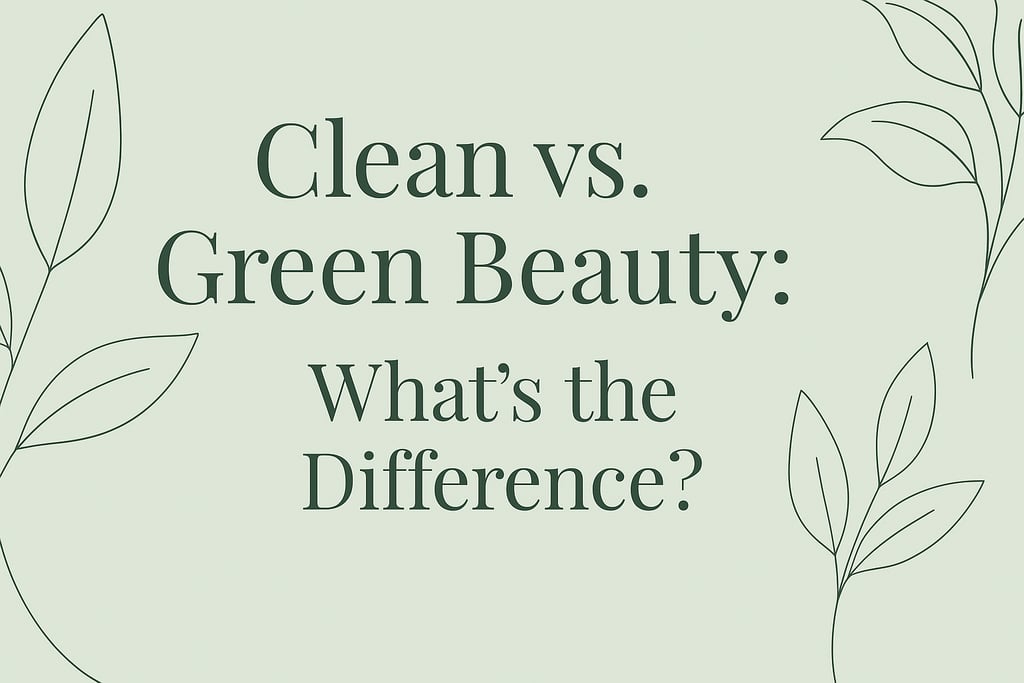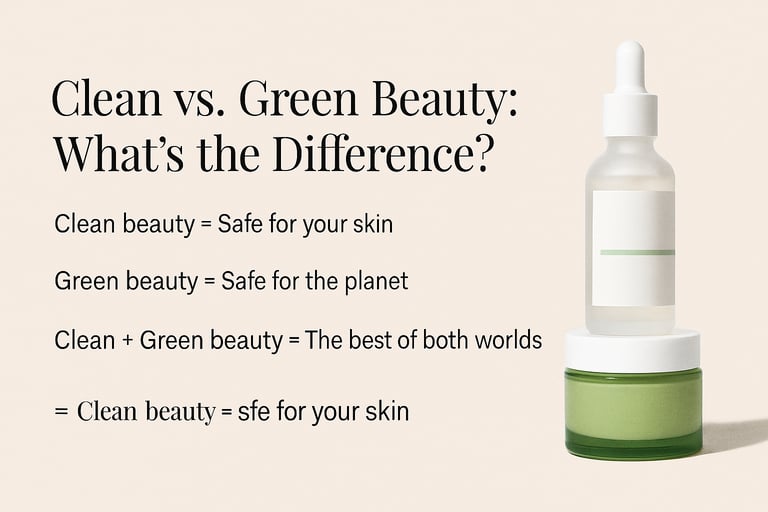🌿 Clean vs. Green Beauty: What’s the Difference?
If you've spent even five minutes shopping for skincare lately, you've probably seen labels like “clean,” “green,” “natural,” “eco,” “non-toxic” — the list goes on. But what do these words actually mean? Let’s break down two of the most popular (and most confusing) terms in the beauty world today: Clean Beauty vs. Green Beauty.
SKINCARE & CLEAN BEAUTYWHAT WE RECOMMEND
6/3/20252 min read


🌿 Clean vs. Green Beauty: What’s the Difference?
If you've spent even five minutes shopping for skincare lately, you've probably seen labels like “clean,” “green,” “natural,” “eco,” “non-toxic” — the list goes on. But what do these words actually mean?
Let’s break down two of the most popular (and most confusing) terms in the beauty world today: Clean Beauty vs. Green Beauty.
✅ What is Clean Beauty?
Clean beauty refers to products that are formulated without ingredients that are potentially harmful to human health.
The focus here is safety — for you.
Clean beauty brands prioritize:
Non-toxic formulas
No parabens, phthalates, sulfates, or synthetic fragrance
Safe synthetics when needed (not necessarily all-natural)
💡 Clean beauty doesn’t always mean natural — and that’s okay. It’s about ingredient safety first.
🌱 What is Green Beauty?
Green beauty takes things one step further — it’s not just about your skin, but about the planet too.
The focus here is sustainability and eco-consciousness.
Green beauty brands typically:
Use natural, plant-based ingredients
Emphasize eco-friendly packaging
Avoid animal testing (often cruelty-free or vegan)
Are mindful of how ingredients are sourced (e.g. fair trade, biodegradable)
💡 Green beauty can be clean — but not always, and vice versa.


🔍 Quick Comparison: Clean vs. Green Beauty
Clean beauty focuses on ingredients that are considered safe and non-toxic for human use. It doesn’t necessarily mean the product is all-natural — some synthetics may still be used if they’re deemed safe and effective. Sustainability might not be a core value here, though many clean brands do care about packaging and ethics.
Green beauty, on the other hand, is all about sustainability and environmental responsibility. These products tend to use natural, plant-based ingredients, are often cruelty-free or vegan, and usually come in eco-conscious packaging. However, “green” doesn’t always mean clinically safe — some natural ingredients can still irritate certain skin types.
In short:
Clean beauty = safe for your skin
Green beauty = safe for the planet
Clean + Green beauty = the best of both worlds
🤔 So… Which Should You Choose?
It depends on your priorities!
Want to avoid harsh chemicals or allergens? → Go clean
Want to reduce waste, support eco-ethics, and go more natural? → Choose green
Want both? Look for brands that are clean and green (yes, they exist!)
🧴 Example:
Mukti Organics – clean formulations and sustainable packaging.
Cliganic – certified organic and cruelty-free, yet super affordable.
Shea Terra Organics – rooted in wild-harvested botanicals, yet free from harsh preservatives.
🛍 How to Shop Smarter
Here are a few tips when navigating clean and green labels:
Look for certifications: EWG Verified, USDA Organic, Leaping Bunny
Read the ingredient list, not just the front label
Beware of greenwashing – don’t be fooled by earthy packaging or vague terms like “pure” or “natural”
Use trusted retailers that curate clean/green products (like PinknBlossom)
🌼 Final Thoughts
You don’t have to pick a side — but understanding the difference between clean and green beauty can help you make more confident, conscious decisions. Whether you're ingredient-focused, planet-conscious, or both, there's a better beauty routine waiting for you.
✨ Start your clean & green journey with our top product picks at Dealaha.com
Quality You Can Trust
Discover handpicked, high-quality products that support a healthier, more intentional lifestyle.
Contact
Stay in the Loop
© 2025 Dealaha™ All rights reserved.
